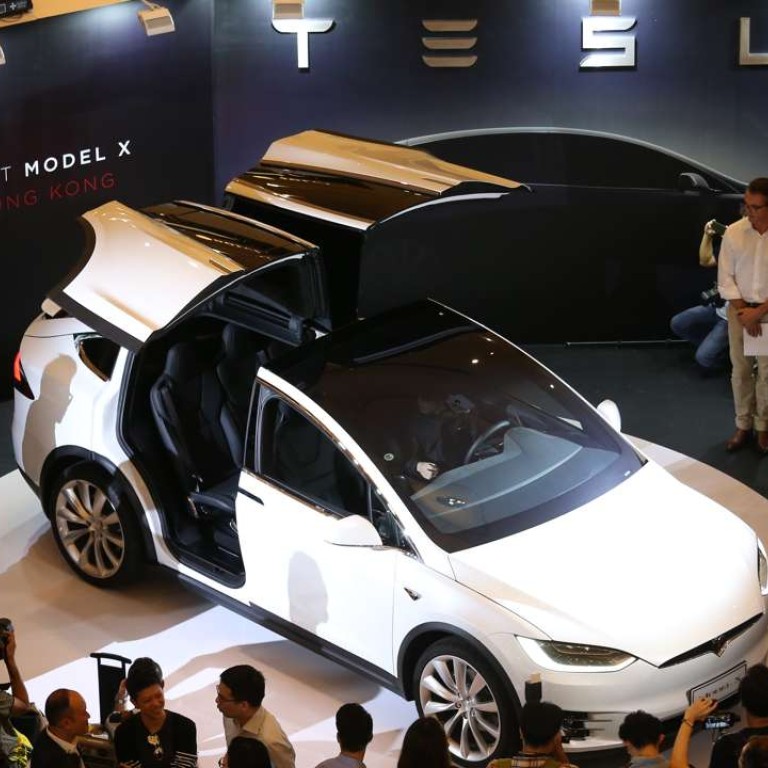
Tesla confident it can hold pole position in Hong Kong’s electric vehicle market
The California carmaker unveils new family-friendly Model X, a follow-up to the Model S, which became the city’s top-selling sedan
As companies such as LeEco and Faraday Future continue to work on electric cars in the hopes of conquering the market segment, Tesla is hardly worried by the upcoming competition.
“I don’t think [Tesla] needs to worry about competition at this point. We are confident about our technology,” said Robin Ren, vice-president for Asia-Pacific at Tesla. “Less than 0.2 per cent of the cars sold globally last year were electric vehicles … so there is a lot of opportunity in the market.”
In August, Chinese internet giant LeEco announced that it would invest 12 billion yuan to create an electric-car factory in eastern China for its LeSee autonomous driving vehicle.
LeEco also invested in Los Angeles-based start-up Faraday Future, which is working on its own FFZero1 concept electric car that is reminiscent of Batman’s Batmobile.
However, Ren said Tesla was still barely scratching the surface for mainstream electric-vehicle adoption despite its fast growth in mainland China and Hong Kong. He added that Tesla hoped more carmakers would join the mix to help shift the world towards electric vehicles as a more sustainable means of transport.
“Even in a city like Hong Kong, [which is successful for Tesla], our growth potential is huge,” Ren said.
He added that only 1 per cent of the vehicles on Hong Kong’s roads were electric despite the city being regarded as one of the most electric-vehicle-friendly in the world.
“If you have 1 per cent market share and you’re growing, then essentially … growth potential is unlimited,” he said.
There were 6,167 electric vehicles in Hong Kong in August, up from fewer than 100 in 2010, according to the Environmental Protection Department. In contrast, the number of private cars reached more than 525,000 in March, according to the Transport Department, close to 99 per cent of which were petrol vehicles.
Despite the challenges in increasing electric-vehicle adoption in Hong Kong, Tesla has continued to push on with its launch of the Model X on Wednesday.
The latest electric sport-utility vehicle is the company’s second widely available car to be released in the city after the hugely successful Model S sedan.
Last year, 2,221 Model S sedans were sold in Hong Kong, making it the top-selling sedan in the city, thanks to a government waiver that exempts electric-vehicle owners from paying the first registration tax.
Tesla has been marketing the Model X as a family-friendly electric vehicle as it can seat up to seven people and has falcon-wing doors that open up on either side of the vehicle to give passengers easy access to the second- and third-row seats.
The Model X can accelerate from stationary to 100km/h in 3.1 seconds, a fraction slower than the Model S, which can do it in three seconds in “Ludicrous” mode.
Prices begin from HK$610,200 and deliveries will begin late this year or early next year.
Isabel Fan, regional director for Tesla Hong Kong, Macau and Taiwan, said the Model X targeted a different demographic of drivers from the Model S.
Most of the customers interested in Model X were first-time Tesla vehicle buyers, with only a “small proportion” from existing Model S users, she said.
“The majority of families in Hong Kong only own one car, and customers see the Model X as an ideal family car as it is more spacious and fits more people [compared to a sedan]. Furthermore, the total cost of ownership is great because they save on petrol and [have access to] charging infrastructure,” Fan said.
Ren believes the Model X will see a similar level of success to that of the Model S in Hong Kong as three of the six bestselling petrol vehicles in Hong Kong last year were SUVs.
“We want to introduce a clean-energy alternative to all the other [petrol-based] SUVs,” Ren said.

